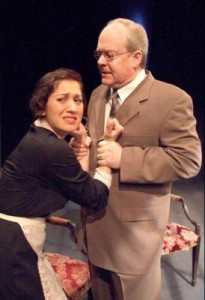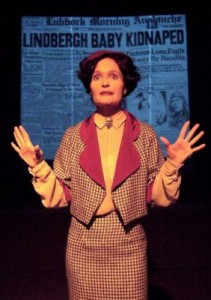RECOMMENDED
On the evening of March 1, 1932, Charles A. Lindbergh, Jr., 20-month-old son of aviator Charles Lindbergh, was kidnapped from the Lindberghs’ New Jersey home. Lindbergh, Sr., who had achieved international fame as the first man to fly solo across the Atlantic, and his wife Anne Morrow Lindbergh, herself an accomplished aviatrix, ended up paying the $50,000 ransom demanded by the unknown kidnapper(s) only to have their son’s decomposed body discovered just miles from their home on May 12. A little over four years after the kidnapping, a German named Bruno Hauptmann was executed for the crime, protesting his innocence till the end.
Books have been written about the kidnapping, both fictionalized and non-fiction, as well as a pair of TV movies. Now, Theatre 40 is presenting William Cameron’s historical drama Violet Sharp, which looks back at the police investigation as it focused on the title character, a young British servant who might have been involved, knowingly or unwittingly, in the kidnapping.
Wikipedia’s article on the so-called “Crime Of The Century” devotes only 45 words to Sharp, stating that she “had given equivocal testimony regarding her whereabouts on the night of the kidnapping and reportedly acted nervous and suspicious when questioned.” Cameron’s often fascinating play, winner of the Beverly Hills Theatre Guild’s Julie Harris Playwriting award, takes a closer look at Sharp as told through the eyes of Adela Rogers St. Johns, noted Hearst newspaper journalist, famed for her emotional, dramatic style of writing and speaking.
St. Johns (Amy Lloyd) sets the scene as a montage of black and white newsreel-style footage is projected upon the screen behind her. Suspicion has fallen on the Lindbergh employees, she reports, and particularly on Violet Sharp, a “waitress” in the Lindbergh home.
Cut to “bad cop-good cop” police detectives Harry Walsh (David Hunt Stafford) and John McGrath (Shawn Savage) interrogating Violet (Meredith Bishop). “When I hear someone saying over and over again they don’t know anything, I start worrying,” Walsh informs her, adding pointedly, “Do you think the baby’s dead?” With Violet responding that she was at the movies with “some people” whose names she can’t recall, no wonder she’s under suspicion. When the spunky young Brit protests that the police are violating her rights, Walsh comes back with “You’re not an American. You have no rights,” and then wonders “Why are you so jumpy?”
Violet later confides to her sister Edna (Rachel Kanouse) that she was out with a boy she met on the street, and sis wonders how Violet’s fiancé, Lindbergh butler Septimus Banks, would feel about this. “He hasn’t asked me to marry him,” replies Violet who, it seems, has quite a dating history and a habit of telling ribald stories to fellow employees. Edna informs her sister that she’s returning to England, which she does only days after the kidnapping. Since Edna is the only person Violet told her plans to the evening of the crime, her leaving the country only increases police suspicions that Violet is hiding something.
Charles Lindbergh (John T. Cogan) and wife Anne (Christine Joëlle) steadfastly defend Violet to the police, but the cops will have none of this. There are simply too many coincidences, and Violet is the best suspect they’ve got.
The role of Violet Sharp once again proves recent Best Actress Ovation Award nominee Bishop to be one of our most watchable young talents. Whether telling her work chums “How to start a motor car” with the bawdiest of double entendres, or verbally dueling with detectives, or beginning to crack under the persistent police questioning, Bishop is never anything less than compelling.
Lloyd is a standout as St. Johns, and hilarious as a very flighty nurse whom the police question about Violet’s supposed tonsillectomy two months after the kidnapping. Stafford has many good moments as no-nonsense cop Walsh and Cogan is effective in his scenes as Lindbergh. Joëlle is particularly touching as Anne Morrow Lindbergh and, in the role of the kidnapped child’s Scottish nursemaid Betty Gow, Cristy Holy has a powerful scene which has her breaking down as she recalls “my baby.” The cast is completed by Adrian Pereira, Robin Leabman, and Katy Miners.
On the “could be improved” side, Monday’s performance had several of the actors stumbling over lines during police interrogations, scenes which need razor-sharp precision to be fully effective. Also, though Leslie has a great voice and commanding stage presence, he appears so much older than the real Septimus (the butler was 40, just 12 years Violet’s senior) that an entirely different image is painted of Violet than would have been the case with an age-appropriate actor.
David Coleman’s direction is for the most part first-rate. The pacing is swift, scene changes happen quickly, and the wide Theatre 40 stage is used effectively. Some blocking does seem awkward, however.
Set design by Jeff G. Rack is minimal, using furniture to suggest various locales, with Jeremy Pivnick’s as always excellent lighting design making the stage look not nearly so bare. Caitlan O’Hare’s costumes suggest the 1930s, though more attention could have been paid to dress lengths. (Adela’s skirts nearly reach her ankles, while Violet’s knee length uniform would be akin to a contemporary servant wearing a micro-mini to work.) Bill Froggatt’s sound design is very good.
All in all, Violet Sharp proves an interesting, sometimes absorbing look back at one of the first “tabloid” crimes in a pre-TV, pre-Internet age. Even back then, the public couldn’t get enough of the lives of the rich and famous.
Theatre 40, 241 S. Moreno Dr., Beverly Hills.
www.theatre40.org
–Steven Stanley
February 16, 2009
Photos: Ed Krieger




 Since 2007, Steven Stanley's StageSceneLA.com has spotlighted the best in Southern California theater via reviews, interviews, and its annual StageSceneLA Scenies.
Since 2007, Steven Stanley's StageSceneLA.com has spotlighted the best in Southern California theater via reviews, interviews, and its annual StageSceneLA Scenies.







 COPYRIGHT 2024 STEVEN STANLEY :: DESIGN BY
COPYRIGHT 2024 STEVEN STANLEY :: DESIGN BY